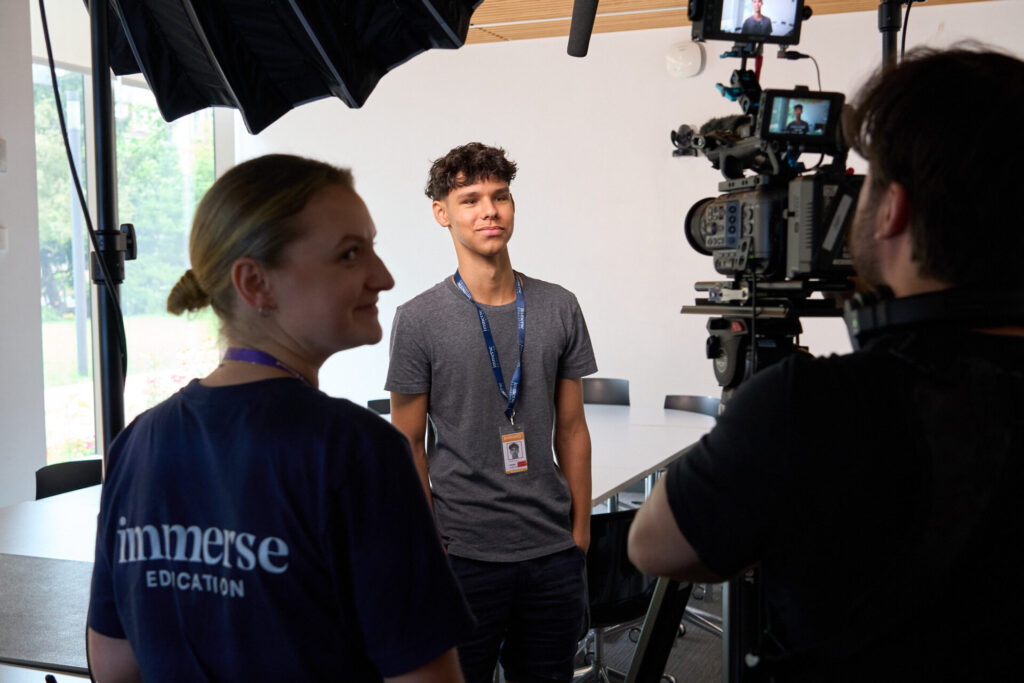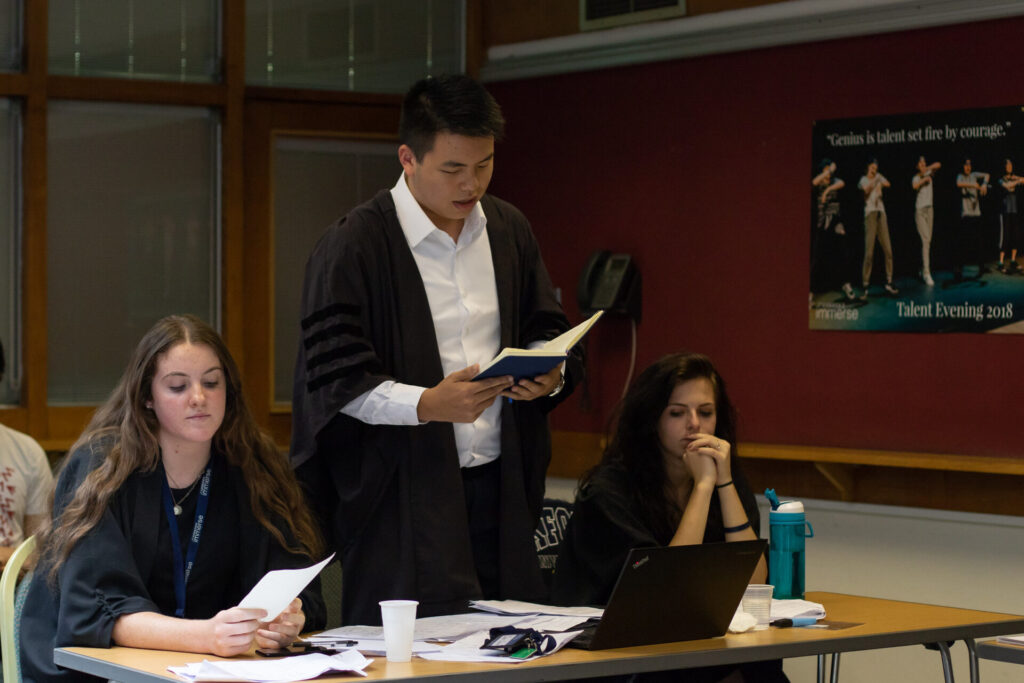It’s no secret that lawyers are in high demand. Every day, people across the country need legal assistance for various issues. But what many people may not know is that becoming a lawyer is a challenging process that requires years of hard work and dedication.
To give you a taste of what being a lawyer is like, check out our Law Summer School. Here students experience Law at the university level so you can get a taster of what law is really like.
Want to learn more about embarking on the journey to becoming a lawyer? There are a few steps that you need to take to become a lawyer in the UK. Here’s a rundown of the process:
What Does It Mean To Be A UK Lawyer?
As you may know, the United Kingdom consists of 4 countries:
- England
- Wales
- Scotland
- Northern Ireland
Within these four countries, there are three legal jurisdictions:
- England and Wales
- Scotland
- Northern Ireland
When we say “UK Lawyer,” it begs the question: Lawyer of which jurisdiction within the UK? The common answer is: in England and Wales. Hence, in this article, we’ll discuss how to become a UK Lawyer in England and Wales.
Preparatory Steps To Becoming a Lawyer
There are many routes to becoming a UK Lawyer. Let’s talk about the different routes as we go through each step. Starting with completing your A-Levels.
1. Complete Your A-Levels
A-Levels allow you to proceed to higher education in all UK academic institutions. So what’s the a-level requirements for law? You need to complete at least 3 A-Level subjects.
Here’s the crucial part, the A-Level subjects you choose and the grades you receive dictate what courses and universities you can apply to. Thankfully, Law courses generally don’t require specific A-Level subjects.
Unlike Medicine, for instance, which often requires Chemistry and/or Biology.
But there are helpful A-Level subjects that can prepare you for studying Law in higher education. University of Oxford is one of the best universities for law in the UK. It states that taking an essay-based subject is helpful, such as
- Economics
- English Literature
- Geography
- History
- Law
- Philosophy
- Psychology
- Sociology
Though these subjects are considered helpful in completing your Law degree, none are required for application.
What about Law at the University of Cambridge? There are also no specific A-Level subjects required.
Aside from A-Level subjects, A-Level grades are also crucial. The University of Oxford requires a minimal A-Level grade of AAA. While the University of Cambridge requires A*AA.
Hence why planning out your A-Level strategy is of utmost importance. Determine what UK Law Schools you want to get into. So you can figure out which subjects to take and what grades to aim for.
What’s an Alternative Qualification to A-Level?
The International Baccalaureate (IB) is an alternative qualification to A-Levels, especially for International Students. Following the previous examples, here are the IB requirements for Law at the following universities:
- University of Oxford – 38 (including core points) with 666 at Higher Level
- University of Cambridge – 40-42 points, with 776 at Higher Level
Of course, there are many prestigious Law schools in the UK you can choose from aside from Oxford and Cambridge.
2. Apply to University and Complete an Undergraduate Degree
Have you decided which universities to apply to? Great! Because the next step to becoming a lawyer is applying for Law at the university and completing an undergraduate degree.
There are two common scenarios in this stage:
- You’re certain you want to become a lawyer, and you want to take the fastest route.
- Sure, you’re thinking of becoming a lawyer. But you also want to explore other subjects.
Who relates with A? If so, then take a Qualifying Degree called the Law LLB. But if you relate more with B, you may want to take the Non-Qualifying Law Degree route.
Need help in writing a Law Personal Statement? Check out “How to Write a Law Personal Statement?”
What’s a Qualifying Law Degree?
A Qualifying Law Degree (Law LLB) is a 3-4 year undergraduate course that allows you to proceed further in your training to become a lawyer. It’s the faster route because you no longer have to take an extra year of law conversion after completing your undergraduate degree.
Here you’ll learn the 7 Foundations of Legal Knowledge, consisting of the following:
- Criminal Law
- Equity and Trusts
- Public Law (Constitutional Law, Human Rights Law, and Administrative Law)
- Land Law
- Tort Law
- Contract Law
- European Law
Focused on becoming a lawyer as fast as you can? Then, take the Qualifying Degree (Law LLB) right off the bat!
What’s a Non-Qualifying Law Degree?
A Non-Qualifying Law Degree (Law BA or Law BSc) allows you to explore the legal sphere. But it’s not sufficient to catapult you straight into the next stage of becoming a lawyer. Unless you take an extra year of law conversion.
Hence why choosing the non-qualifying Law Degree route is longer. However, the advantage of taking a Non-Qualifying Law Degree is the chance to explore other subjects via joint Law courses.
It’ll also give you more time and knowledge to decide whether to become a lawyer or to explore other career options with a strong background in Law (e.g. Law Academia.)
Can I still become a lawyer by taking a Law-unrelated subject?
Yes! But just like a Non-Qualifying Law Degree, you’ll have to take an extra year taking a law conversion course. Afterwards, you can proceed to the next step.
3. Decide Whether You Want to Become a Solicitor or Barrister
Do you know that becoming a lawyer in the UK consists of choosing whether to become a Solicitor or Barrister? The division of the English Legal Profession into these two branches naturally came from historical rather than intentional causes.
So what’s a solicitor, and what’s a barrister?
What’s a Solicitor?
A solicitor is a lawyer who works outside of court. Meaning they are often the first point of contact with the client. When clients need legal advice on a particular legal matter, they go to a solicitor. Solicitors advise clients on a broad range of matters, including
- Personal Issues (e.g. wills, buying houses, divorce)
- Commercial Issues (e.g. licensing, trademarking, mergers and acquisitions)
They tend to have specialisations in a particular area of law, such as
- Criminal Law
- Personal Injury
- Property
- Commercial Law
- Employment Law
There are over 24 different law specialisations a solicitor can focus on.
What’s the work setup of solicitors? It’s common for them to be employed and salaried by law firms, organisations, or government institutions. They conduct client transactions within their designated office.
As of October 2022, the Solicitors Regulation Authority reports that there were 219,424 solicitors in England and Wales.
What’s a Barrister?
If a solicitor works outside of court, barristers work inside. This means they’re involved in a case only when it’s necessary to appear before a court.
Since the solicitor is the client’s first point of contact, they hire the barrister to advocate on behalf of the client within the courtroom setting.
Unlike solicitors, who are often employed, barristers are generally self-employed. There are exceptions, of course. For instance, some barristers work as employees in the following settings:
- Government departments (e.g. Government Legal Profession)
- Independent agencies (e.g. Crown Prosecution Service)
- Private organisations
- Charities
Like solicitors, Barristers specialise in any of the 24 different areas of Law. They have specialist knowledge and are well-versed in the intricacies of the court system. Barristers can work as individual practitioners or in groups called “chambers.”
Exceptional senior barristers climb the highest rank known as the “King’s Counsel.” They are known to “receive the silk” since they proceed to wear silk gowns. Marking their peerless ability. Guess who handles the most complex and severe cases? The King’s Counsel.
Here’s a fun fact, during the long-lasting reign of Queen Elizabeth II, those who received the silk were known to be part of the “Queen’s Counsel.”
The UK’s Bar Council states that there are over 16,500 Barristers in England and Wales.
How Do You Know If You Want to Become a Solicitor or a Barrister?
After completing an undergraduate degree, you’ll have to decide which path to take: becoming a solicitor or barrister? From here on out, the road diverges. So how do you decide which suits you better? Here are some factors to consider:
What Work Schedule Do You Prefer?
Solicitors are employed, while barristers are often self-employed. Let’s talk about the advantages and disadvantages of the employment structure for solicitors.
| Advantages | Disadvantages |
| Fixed and guaranteed monthly salary for added stability and security. Employment benefits such as annual leave, bonuses, maternal leave, etc. | If you don’t like working for 8 hours straight during workdays, you may not like the solicitor’s employment structure. |
What about the advantages and disadvantages of being self-employed? Consider the following:
| Advantages | Disadvantages |
| You manage your time more freely. You can choose how much client load you’ll receive at a given period. Barristers often charge more per hour because of their more specialised role. Hence, you can have a say in how much you want to earn according to how much load you’ll take on. | Suppose you’d want the benefits and benefits that come with employment. In that case, you won’t experience these in the self-employment work structure. |
Given the advantages and disadvantages, which work structure better fits your personal and career goals?
Does Your Personality Point You Toward a Solicitor or Barrister?
Your personality plays a significant role in determining whether you want to be a solicitor or a barrister. Why? Because the nature of their work and client interaction is different. Check out the differences:
| Solicitor | Barrister |
| You’ll interact more with your client because you’re the first point of contact. And you’ll stay with them until the case finishes. Are you comfortable establishing long-term professional relationships?Solicitors often work in private meetings and interactions. Do you work better behind the scenes? | Barristers are only needed in a client’s legal journey when representation in a court is necessary. It’s not unusual for a barrister to receive the papers within 24 hours and proceed to advocate for the client. Do you enjoy lightning-fast scenarios that make you think on your feet? Barristers often speak in public to defend the client. They receive instructions from the solicitor on how best to do so. Does public speaking excite you? |
If you’re more client-relationship-oriented and prefer to work privately, you’d probably prefer to become a solicitor.
Do you prefer the challenge and excitement of handling several complex cases within a shorter period? And are you comfortable speaking in public? You’ll most likely want to become a barrister.
What’s Your Core Strength?
The core skills you possess are a helpful factor in deciding whether you want to become a solicitor or barrister. So what do you need to become a solicitor?
Skills Necessary To Become a Solicitor
- Research skills
- Analytical skills
- Long-term relationship-building with clients
- Commercial awareness
- Listening skills
- Written and oral communication skills
- Attention to detail
- Teamwork
Skills Necessary To Become a Barrister
- Assimilate and process information fast (since you’ll handle the more specific details of the legal case)
- Fluent oral communication skills
- Public Speaking
- Strong argumentation skills
- Presentation skills
- Strong advocacy skills
- Attention to detail
- Teamwork
In which category do you think you excel more? Do you possess more skills necessary for a solicitor or barrister?
What If You’re Still Unsure?
No need to worry! The path to becoming a lawyer doesn’t have to be a straight, stiff line. Do you know solicitors can still choose to become barristers?
Sometimes, you need more experience and exposure to the industry to properly make up your mind. In addition, why not talk to solicitors and barristers? Ask them about their journeys. A couple may resonate with you and help you find your calling.
If such is the case with you, go ahead and explore! You’ll indeed discover your own path sooner or later.
Join the Immerse Education 2025 Essay Competition
Follow the instructions to write and submit your best essay for a chance to be awarded a 100% scholarship.

How to Become a Solicitor
So, you want to become a solicitor. What should you do next after getting your undergraduate degree?
If your undergraduate degree wasn’t a qualifying Law degree (LLB), you’d need to do Law conversion. The equivalent to Law conversion of aspiring solicitors with the new SQE (Solicitor Qualifying Exam) system is to take the SQE1 preparation course (commonly known simply as the SQE preparation course.)
Are graduates of the Law qualifying LLB degree required to take the SQE preparation course? No, but it can be useful to do so.
After sufficient preparation, it’s time to proceed to the SQE proper. SQE consists of the following:
- Two major assessments to test your legal knowledge (SQE1 and SQE 2)
- And a 2-year period to gain Qualifying Work Experience (QWE)
SQE1 is a mandatory prerequisite of SQE 2. But for QWE, you can take it at any point once you’ve registered with SQE.
What’s SQE1?
The SQE1 assesses your Functioning Legal Knowledge (FLK.) It’s split into two: FLK1 and FLK2. Do you take them on the same day? Nope, you take them on separate days.
Both FLK1 and FKL2 have the following similar characteristics:
- They have 180 multiple-choice questions
- Split into two sessions containing 90 questions each
- Each session lasts for about 2 hours and 30 minutes.
- You’ll have a 1-hour break between the 2 sessions.
Some of the topics you’ll encounter include:
- Administrative Law
- Business Law
- Contract Law
- Tort Law
- Legal System of England and Wales
- Criminal Law and Practice
What’s SQE2?
The SQE2 tests your oral and written skills. That’s why SQE2 is divided into the SQE Oral and SQE Written. The SQE Oral takes place in a span of 2 half-days. It tests your legal analysis and advocacy skills.
While the SQE Written assessments occur within 3 half-days, and it checks your ability following:
- Legal writing
- Legal drafting
- Legal research
- And case and matter analysis.
What’s QWE?
The QWE (Qualifying Work Experience) is a mandatory two-year work experience. Through the QWE, you’ll have the opportunity to provide legal services. Helping you develop specific competencies you’ll need to pass SQE, including:
- Ethics, professionalism and judgement
- Technical legal practice
- Working with other people
- Managing personal workload
These competencies are known as the SRA (Solicitor Regulation Authority) competencies.
Aspiring solicitors undergoing QWE can train in up to 4 different organisations. Will you have to work in a law firm? Not at all. But it has to be an organisation that offers legal services (e.g. legal charity.)
You now know the general steps of becoming a solicitor. Up next, how do you become a barrister?
How to Become a Barrister
There are 3 major parts to becoming a barrister:
- Academic
- Vocational
- Pupillage
Part 1: Academic Step
After completing your undergraduate degree, what’s the next step to becoming a Barrister? The first step is determining what type of degree you accomplished.
Is it a non-qualifying degree? If so, you must first undergo a 1-year law conversion course called the PGDL (Postgraduate Diploma in Law.)
What’s PGDL?
The Postgraduate Diploma in Law (a.k.a. PGDL) is a Law conversion course for graduates who aspire to be Barristers but haven’t completed qualifying Law degrees. So how long does it last? One year if you take it full-time. But 2 years if you take it part-time.
What’s the PGDL course structure? The exact course structure differs depending on the academic institution facilitating the course.
But you can expect the 7 Foundations of Legal Knowledge mentioned earlier:
- Criminal Law
- Equity and Trusts
- Public Law (Constitutional Law, Human Rights Law, and Administrative Law)
- Land Law
- Tort Law
- Contract Law
- European Law
If you’ve completed an LLB (qualifying-Law degree), you can proceed straight to the next step.
Part 2: Vocational Step
The vocational step ensures you develop the skills and knowledge you need to become a Barrister. To be more specific, you’ll learn and develop the following:
- Specialist barrister skills
- Knowledge of barrister procedure and evidence
- What constitutes a proper barrister attitude and how to embody it
- The competence you need to accomplish barrister responsibilities
To begin, you must set about joining any one of the famous Four Inns of Court.
The Four Inns of Court
What’s the Four Inns of Court (a.k.a. “Inns”)? It’s a group of professional associations in London with a history going back a long way to the middle ages. And the Four Inns are traditionally responsible for legal education.
The Inns provide considerable support to their students, such as:
- Scholarships
- Training
- Careers Advice
- Educational Activities
- Facilities (e.g. library, lunch rooms, etc.)
Most importantly, the Inns are the only institutions with the power to call students to the Bar. Hence, you’ll have to undergo training in one of the Four Inns of Court to become a Barrister in England and Wales, including the following:
Choosing which Inn to join requires proper decision-making. Why? Because it’s a lifetime membership. Of course, they have many similarities in that they all have:
- Long histories and traditions
- Beautiful architecture
- Renowned former members
- Scholarships and funding to offer
They also have their respective differences. When the time comes for you to choose, it’s best to visit the Inns yourself and ask around.
Bar Practice Course (BPC)
You can apply for a Bar Practice Course (BPC) once you’re an Inn member and pass the Bar Course Aptitude Test (BCAT.) The BPC was once known as the Bar Professional Training Course (BPTC.)
What’s the BPC? It’s a qualifying postgraduate course designed to prepare graduates to become Barristers during the vocational part. The main emphasis is on practical work. Note that BPC has various names depending on the provider, such as
- Bar Training Course (BTC)
- Bar Vocational Studies (BVS)
- Bar Vocational Course (BVC)
It’s through the BPC that you’ll undergo the seven compulsory modules necessary to complete the vocational component, including:
- Civil litigation and evidence, incorporating dispute resolution
- Advocacy
- Conference skills
- Drafting
- Opinion writing
- Legal research
- Criminal litigation, evidence and sentencing
- Professional ethics
Universities offering BPCs (or its equivalent names) include:
- BPP University
- Cardiff University
- Northumbria University
- Manchester Metropolitan University
- The University of Law
- The City Law School, City, University of London
- Nottingham Trent University
- University of Hertfordshire
Qualifying Sessions
To complete the vocational part of becoming a barrister, you’re mandated to attend complementary “qualifying sessions” provided by your Inn. These may be any of the following:
- Advocacy courses
- Lectures
- Moots
- Dinners
Qualifying sessions must cover the following categories:
- Advocacy Skills
- Ethics, Standards and Values
- Equality, Diversity and Inclusion
- Legal Knowledge, Justice and the Rule of Law
- Preparation for Pupillage, Career Development and Wellbeing
How many qualifying sessions do you need to complete before the “Call to the Bar?” Ten.
You now have a better idea of what vocational training consists of. What’s next? Pupillage.
Part 3: Pupillage
You can think of pupillage as an apprenticeship to becoming an official Bar member. To help you remember easier, pupillage’s root word is “pupil.” To denote your status as a pupil barrister.
Once you finish this stage, you’ll become a full-fledged, independent barrister.
Where does Pupillage training happen? Often in the chambers under the guidance of experienced barristers. Sometimes, at a Bar organisation where barristers are employed.
There you have it! You now have a solid idea of the steps you need to take to become a lawyer. Do you want to know more? Check out this article, “What can you do with a Law Degree?”

























